" DISAPPOINTMENT " IN NORFOLK.
[To THE EDITOR OF THE " SPECTATOR:]
SIR,—The reviewer of "Poets the Interpreters of their Age" expresses a wish that the English language had a word for the emotion the opposite pole to "disappointment." If he would come to Norfolk, we could supply him, not, indeed, with a dif- ferent word, but -with the same word used in an opposite sense. " Disappointment " is used, by a certain class, more commonly to express agreeable surprise than in any other sense, and you must wait for the rest of the sentence to know what is meant. "I am quite disappointed in John ; I never thought he would settle to the business at all, and now he have done so well, his master have promised to raise his wages," is a sentence that would not puzzle a Norfolk person, though if the speaker were genuine Norfolk, she would say " haine him," instead of "raise his wages."—I am, Sir, &c.,
E.G. T. F.


































 Previous page
Previous page